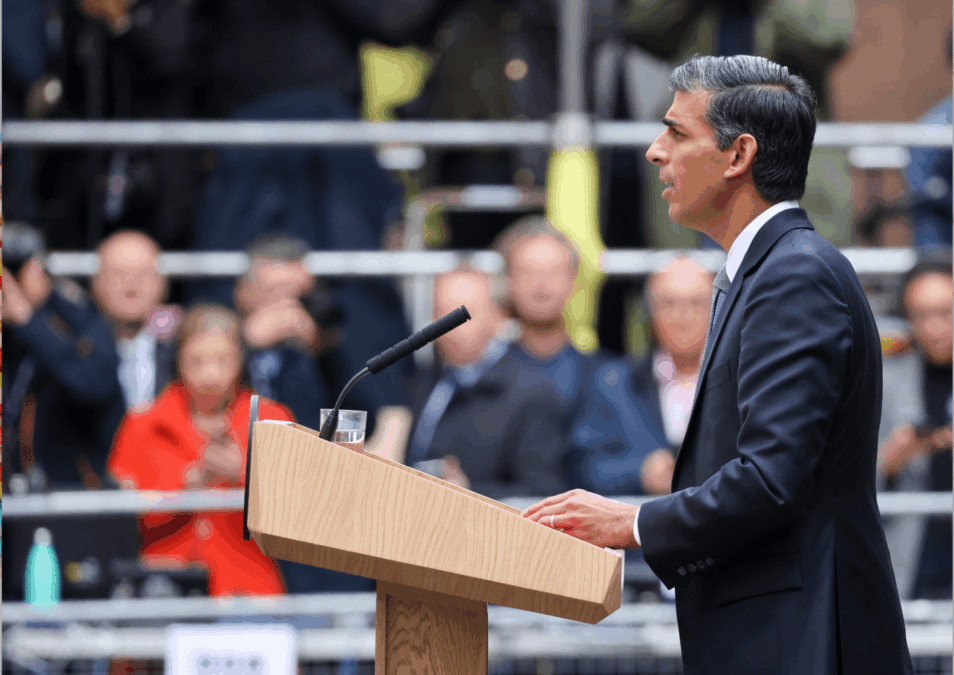British Prime Minister Rishi Sunak hailed the adoption, in the night from Monday, April 22 to Tuesday, April 23, of the controversial bill allowing for the expulsion to Rwanda of asylum seekers who have illegally entered the United Kingdom.
Announced in 2022 by his Conservative government and presented as a key element of its policy to combat illegal immigration, this measure aims to send migrants who have illegally arrived in the UK to Rwanda, regardless of their country of origin. It will be up to the East African country to consider their asylum applications. In any case, the applicants will not be able to return to the United Kingdom.
“The law clearly establishes that if you come here illegally, you will not be able to stay,” stated Rishi Sunak. On Monday, the Prime Minister assured that his government was “ready” to expel asylum seekers to Rwanda. “The first flight will depart in ten to twelve weeks,” he said, meaning sometime in July. According to him, these flights could have started earlier “if the Labour Party hadn’t spent weeks delaying the bill in the House of Lords in an attempt to completely block it.” “These flights will take off, no matter what,” he insisted during a press conference before the vote.
The government has mobilized hundreds of officials, including judges, to quickly process any appeals from illegal migrants and has unlocked 2,200 detention places while their cases are being reviewed, the Prime Minister announced. “Charter planes” have been booked, he added, as the government reportedly struggled to convince airlines to contribute to the expulsions. A first flight was supposed to take off in June 2022 but was canceled following a decision by the European Court of Human Rights (ECHR).
How Much Will This Cost the British?
This text is part of a broader new treaty between London and Kigali, which involves substantial payments to Rwanda in exchange for hosting migrants. The government has not disclosed the total cost of the project, but according to a report presented in March by the National Audit Office (NAO), the public spending watchdog, it could exceed £500 million (over €583 million).
“The British government will pay £370 million [€432.1 million] under the partnership between the UK and Rwanda, an additional £20,000 per person, and £120 million once the first 300 people have been relocated, plus £150,874 per person for processing and operational costs,” summarized the NAO. The UK would thus pay £1.8 million for each of the first 300 expelled migrants. An estimate that has outraged the Labour Party. Leading in the polls for the upcoming legislative elections, Labour has promised to replace this scheme, which it deems too costly. However, the Prime Minister assured that this measure was “a good investment.”
How Does Kigali React?
The government of Kigali, the Rwandan capital, expressed “satisfaction” with this vote. The country’s authorities are “eager to welcome relocated individuals to Rwanda,” said government spokesperson Yolande Makolo. “We have worked hard over the past 30 years to make Rwanda a safe and secure country for both Rwandans and non-Rwandans,” she said. Thus, this new treaty has addressed the conclusions of the British Supreme Court, which deemed the initial project illegal in November.
The court had ruled that migrants were at risk of being expelled from Rwanda to their country of origin, where they could face persecution, which contravenes Article 3 of the European Convention on Human Rights on torture and inhuman treatment, of which the UK is a signatory. The law now defines Rwanda as a safe third country and prevents the deportation of migrants from this country to their country of origin.
4. What Are the International Reactions?
This vote comes as a new tragedy occurred on Tuesday in the English Channel with the death of at least five migrants, including a 4-year-old child. The UN has asked the British government to “reconsider its plan.” The UN High Commissioner for Human Rights, Volker Türk, and his counterpart responsible for refugees, Filippo Grandi, called on the government, in a statement, “to take practical measures to combat irregular flows of refugees and migrants, based on international cooperation and respect for international human rights law.”
“This new legislation seriously undermines the rule of law in the UK and sets a dangerous precedent globally.”
Volker Türk, UN High Commissioner for Human Rights in a statement The Commissioner for Human Rights of the Council of Europe, Michael O’Flaherty, has described this law as “an attack on the independence of the judiciary.” Amnesty International UK referred to it as a “national disgrace” that “will leave a stain on this country’s moral reputation.”
The president of Amnesty International France, deplored “an unspeakable infamy” and “hypocrisy” based on a lie, that Rwanda is considered a safe country for human rights. The NGO has documented cases of arbitrary detention, torture, and repression of freedom of expression and assembly in Rwanda,” he listed. According to him, “the asylum system is so flawed” in Rwanda that there are “risks of illegal returns.”







